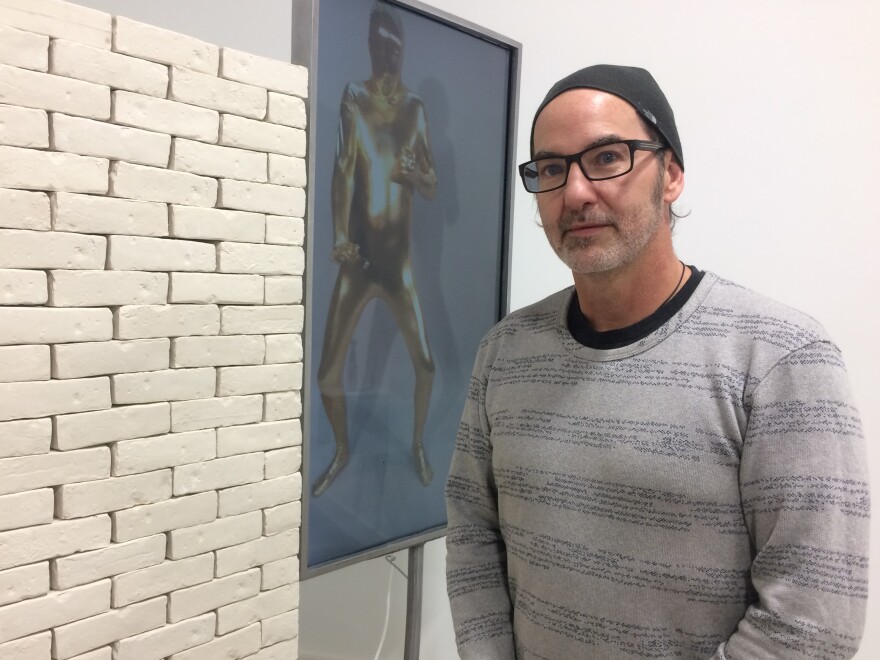In a land of Americana music and art imbued with the mountains, you can forget you’re in Asheville while you’re inside Revolve.
It’s a gallery and performance space in the RAMP Studios, an unmarked industrial building near UNC-Asheville. Revolve is dedicated to contemporary, experimental work -- meaning, it’s 180 degrees from the music and art you’ll generally find along the region’s paths of tourism.
“Its location is a little outside the River Arts District in a traditional sense, and that’s actually on purpose,” said Colby Caldwell, Revolve’s founding director. “We wanted to be more of a destination place, a place people wanted to come to and not just stumble upon.”
Caldwell grew up in Mills River and graduated West Hendersonville High School. Caldwell built a thriving art-photography practice and a tenured teaching position over 25 years in and around Washington DC. He never planned a return to Western North Carolina, but a relationship brought him back to the mountains in 2012.
“I did have museum shows. I wasn’t on the cover of ArtForum, but I was reviewed (in the magazine). It didn’t really alter or change my life,” he said. “So why am I focused on these supposed markers about what makes an artist or art career successful?”
Caldwell opened a studio and gallery space at the Cotton Mill Studios in Asheville’s River Arts District. His landlords and early champions were new Brooklyn transplants Denise Carbonell and Derek Dominy. When the couple sold the Cotton Mill in 2016, they gave Caldwell the money to open Revolve in the RAMP Studios, along Riverside Drive. They also just donated $80,000 to support new intiatives at Revolve.
“Every show he does, to me, is so different from the one before, and I love that,” she said. “It’s a little like BAM (the Brooklyn Academy of Music). It’s eclectic. You’re not surprised by anything he says, ‘I’m doing a show on …’ and you go ‘Really?’”
Revolve certainly isn’t Asheville first foray into contemporary arts. For 13 years, the Media Arts Projecthas cultivated innovative arts and technology in western North Carolina. Black Mountain College Museum presents contemporary performance and you’ll find daring work at the Center for Craft, Creativity and Design.
But until Revolve, which now operates in partnership with the Media Arts Project, there hasn’t been a dedicated home for multidisciplinary art, media and performance.
“It’s activated the building in a way it hasn’t been activated before,” Caldwell said. “When you see your audience double or new faces show up, you realize there’s a hunger and desire for this kind of programming in a space that’s more mindful than a bar or cafe.”
Revolve is a nonprofit with a board of directors. So while artists presenting there certainly hope to sell their work, that isn’t Caldwell’s goal.
“There’s really a wonderful network of folks here who were interested in pursuing and finding opportunities for artists who weren’t looking to sell first, but express first,” he said.
Constance Humphries is a dancer now focused on the art of butoh and she’s Revolve’s first resident artist. She says Revolve’s intimacy works especially well for music.
“It fits a niche of smaller audiences, maybe more experimental work,” she said. “It’s challenging while being more accessible, if that’s possible.”
For the coming year, Caldwell wants to grow Revolve’s community outreach, its artist residency program and an avenue for crowdfunding. Somewhere, somehow, he will also continue his own photography practice.
A new exhibition, “The Art of Design,” opens with a public reception Dec. 2 in the Revolve Gallery.
“Fifteen people may not seem like a lot of people to put together a program around,” Caldwell said “But 15 people are 15 more who got to see contemporary work around Asheville who wouldn’t have.”





